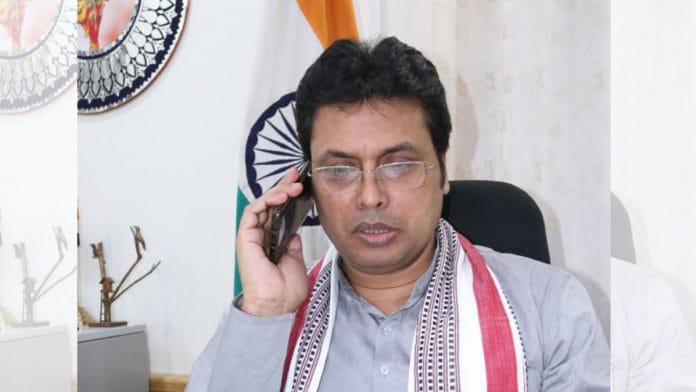New Delhi: With 13 more Border Security Force (BSF) jawans testing positive for the novel coronavirus, Tripura saw its active Covid-19 cases go up to 43 Wednesday. All the active cases are related to the BSF, and include jawans, their family members and a mess worker.
The fresh cases were confirmed from a single location — the 138th battalion of BSF in Dhalai district — in the past four days. On 2 May, two jawans had tested positive and a day later, 12 others were found to have been infected.
Chief Minister Biplab Deb Tuesday took to Twitter to confirm the development and also requested people to not panic.
Alert!
13 persons from 138th-Bn #BSF Ambassa found #COVID19 POSITIVE today including 1 Mess worker.
Total #COVID19 positive cases in Tripura stands at 42 (2 already discharged, so active cases : 40)
There is no POSITIVE case among civilians.
Don't Panic!#TripuraCOVID19Count
— Biplab Kumar Deb (@BjpBiplab) May 5, 2020
Also read: Assam cancels annual Kamakhya temple fair, largest Hindu event in NE — a first in centuries
Harvard includes Assamese scholar’s essay on Sankaradeva in curriculum
An essay written by Assamese scholar Dr Sanjib Kumar Borkakoti on the 15th century saint-reformer Srimanta Sankaradeva is now part of the course material at Harvard University’s Department of Religion.
Titled Unique features of Srimanta Sankaradeva’s religious philosophy Vivaratanvâda: Comparison with other Sanâtana Hindu philosophies, the essay was written by Borkakoti about 15 years ago and uploaded on a website in 2011.
Borkakoti, an industrial economist based out of Nagaon in central Assam, said the essay sought to depict how Sankaradeva’s philosophy was different from other Indian Hindu philosophies.
“This is probably the reason why they (Harvard) got attracted. Sankaradeva was the world’s first philosopher who could synthesise the path of knowledge and the path of devotion,” he said.
He, however, said that Harvard hasn’t contacted him yet. “We have an organisation called Society for Srimanta Sankaradeva and it has a website sankaradeva.com. We also have a Facebook group Followers of Srimanta Sankaradeva. We had uploaded the essay … on both platforms. It appears that Harvard University collected it from one such public domain.”
Borkakoti has been a researcher of medieval Assamese literature and Sankari culture, an extension of Vaishnavism that was propagated by Sankaradeva in Assam. He has written 65 books so far, most of them about Sankaradeva.
Also read: Meal for Rs 1 on Assam highway — how a dhaba owner’s doing his bit in fight against Covid
Mizoram first Northeastern state to bring ordinance for lockdown violations
Mizoram became the second state, after Rajasthan, to bring an ordinance for stricter punishment against residents violating Covid-19 restrictions. It is the first state in the region to bring such an ordinance.
The ordinance, called the Mizoram (Containment and Prevention of COVID-19) Ordinance, 2020, stipulates an imprisonment of up to three months and a fine of Rs 5,000 for violations of personal and public safety norms.
Offences under the ordinance include not wearing masks, failure to maintain social distancing protocols in public places, spitting in public, organising social or religious events without permission from the competent authority, crossing state borders without permission and avoiding or attempting to evade quarantine.
It also bars revealing the identity of Covid-19 patients or suspected persons by sharing their biodata and/or photo in any print, electronic and social media platform without permission.
Asked to wear mask, Assam man brings fish to the hospital
A man in Assam’s Udalguri district had gone to a community health centre earlier this week to buy medicines when the nurse on duty asked him to first wear a mask.
The man promptly returned an hour later with a mid-sized fish. The medical staff soon realised that he had mistaken the word mask for maas, which means fish in Assamese.
Tayabur Rahman, joint director of health in Udalguri, was quoted as saying: “The nurse at the medicine counter asked him why he had come without wearing a mask that could save him from infection. She advised him to buy a mask … and then get his medicines. It was apparent he did not know what a mask was when he returned with a fish.”
The hospital staff later gifted the farmer a mask and asked him to take the fish home along with the medicines he needed.
Also read: ‘They all spoke in Hindi’: When Mizoram CM hit translation hurdle at meeting with PM Modi
Documentary on Arunachal’s last honey hunters wins Dada Saheb Phalke award
Kezang D. Thongdok’s 26-minute film Chi Lupo, which chronicles the last honey hunters of Arunachal Pradesh, was recently adjudged the ‘best documentary’ at the 10th Dada Saheb Phalke Film Festival Awards 2020.
Only six men belonging to the Sherdukpen tribe in Arunachal Pradesh practise honey hunting today. An age-old skill, honey-hunting or Chi Lupo (‘Chi’ means honey and ‘Lupo’ means hunter in Sherdukpen) involves travelling deep into forests to gather a special kind of honey found on hives in rocky hilltops.
Thongdok and his crew had accompanied a group of honey hunters to the Shra Numah hill near Thongri village of Arunachal between June and July 2018. He has been quoted by The Indian Express as saying: “It took a little convincing but the hunters agreed — they felt documenting this was important.”
He also said that honey hunting happens in October and November when the rhododendron flowers are in full bloom, and in June-July.
Also read: What is African Swine Fever? Disease that has killed over 2,500 pigs in 306 Assam villages






